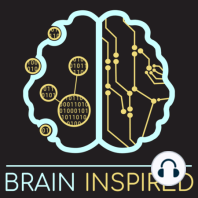43 min listen
BI 161 Hugo Spiers: Navigation and Spatial Cognition
FromBrain Inspired
ratings:
Length:
95 minutes
Released:
Feb 24, 2023
Format:
Podcast episode
Description
Support the show to get full episodes and join the Discord community.
Check out my free video series about what's missing in AI and Neuroscience
Hugo Spiers runs the Spiers Lab at University College London. In general Hugo is interested in understanding spatial cognition, like navigation, in relation to other processes like planning and goal-related behavior, and how brain areas like the hippocampus and prefrontal cortex coordinate these cognitive functions. So, in this episode, we discuss a range of his research and thoughts around those topics. You may have heard about the studies he's been involved with for years, regarding London taxi drivers and how their hippocampus changes as a result of their grueling efforts to memorize how to best navigate London. We talk about that, we discuss the concept of a schema, which is roughly an abstracted form of knowledge that helps you know how to behave in different environments. Probably the most common example is that we all have a schema for eating at a restaurant, independent of which restaurant we visit, we know about servers, and menus, and so on. Hugo is interested in spatial schemas, for things like navigating a new city you haven't visited. Hugo describes his work using reinforcement learning methods to compare how humans and animals solve navigation tasks. And finally we talk about the video game Hugo has been using to collect vast amount of data related to navigation, to answer questions like how our navigation ability changes over our lifetimes, the different factors that seem to matter more for our navigation skills, and so on.
Spiers Lab.
Twitter: @hugospiers.
Related papers
Predictive maps in rats and humans for spatial navigation.
From cognitive maps to spatial schemas.
London taxi drivers: A review of neurocognitive studies and an exploration of how they build their cognitive map of London.
Explaining World-Wide Variation in Navigation Ability from Millions of People: Citizen Science Project Sea Hero Quest.
Check out my free video series about what's missing in AI and Neuroscience
Hugo Spiers runs the Spiers Lab at University College London. In general Hugo is interested in understanding spatial cognition, like navigation, in relation to other processes like planning and goal-related behavior, and how brain areas like the hippocampus and prefrontal cortex coordinate these cognitive functions. So, in this episode, we discuss a range of his research and thoughts around those topics. You may have heard about the studies he's been involved with for years, regarding London taxi drivers and how their hippocampus changes as a result of their grueling efforts to memorize how to best navigate London. We talk about that, we discuss the concept of a schema, which is roughly an abstracted form of knowledge that helps you know how to behave in different environments. Probably the most common example is that we all have a schema for eating at a restaurant, independent of which restaurant we visit, we know about servers, and menus, and so on. Hugo is interested in spatial schemas, for things like navigating a new city you haven't visited. Hugo describes his work using reinforcement learning methods to compare how humans and animals solve navigation tasks. And finally we talk about the video game Hugo has been using to collect vast amount of data related to navigation, to answer questions like how our navigation ability changes over our lifetimes, the different factors that seem to matter more for our navigation skills, and so on.
Spiers Lab.
Twitter: @hugospiers.
Related papers
Predictive maps in rats and humans for spatial navigation.
From cognitive maps to spatial schemas.
London taxi drivers: A review of neurocognitive studies and an exploration of how they build their cognitive map of London.
Explaining World-Wide Variation in Navigation Ability from Millions of People: Citizen Science Project Sea Hero Quest.
Released:
Feb 24, 2023
Format:
Podcast episode
Titles in the series (99)
BI 100.1 Special: What Has Improved Your Career or Well-being?: Brain Inspired turns 100 (episodes) today! To celebrate, my patreon supporters helped me create a list of questions to ask my previous guests, many of whom contributed by answering any or all of the questions. Ive collected all their responses into separ by Brain Inspired
